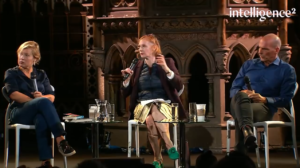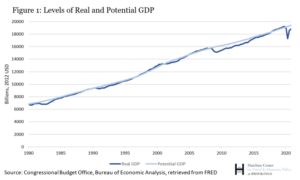This post is part of a series about a discussion (framed as a debate) between Gillian Tett and Yanis Yaroufakis on the subject of saving capitalism. If you found this post via an Internet search, it probably makes sense to start with the first post in the series, the link to which can be found above, and here.
Saving capitalism: Q&A session
In some cases, multiple questions were requested from the audience before answers were provided.
Since highly concentrated capitalism was fixed through regulation in the 1890s (Standard Oil, etc) why can’t regulation fix the current tech concentration of power? and What are you thoughts on emerging socialist societies, like the Zapatistas in Mexico? and Why does today’s concentration of corporate power feel like the end of capitalism when prior such concentrations, the Dutch East India Company for example, were resolved through regulation?
Yanis started by addressing the East India Company example. He said capitalism succeeded because it went beyond what the East Indian Company did, with protection, not just exploitation, appropriation, and trade.
He then shifted to the Standard Oil question. He said Standard Oil was extremely powerful and Theodore Roosevelt did amazingly well to break it up through legislation which is to be applauded. So, can we do the same today with Amazon, Facebook, etc? No, he doesn’t think so. Things are different now.
The difference in his mind is that standard oil was a monopoly within a market. When he contrasts that with Amazon he sees something different. Per Yanis, Amazon is like a dystopian science fiction movie where you walk down the street and every building is owned by the same person and everything that is bought or sold is controlled by one person. Even the park bench you sit on is owned by the same person.
Everything you see and don’t see is controlled by one person. He states this is worse than Orwell.
That is not a monopoly, that it’s a fiefdom, similar to Downtown Abbey where the lord owns the whole thing, but this time it’s a techno-fiefdom and the power that is bestowed on the people who owns it is so great that he believes it is not possible to break them up these modern fiefdoms via antitrust regulation.
Gillian responded to the question about the Zapatistas. She said that her desire for competition extends to pluralism and that economies and societies are best served when you have a divergence of ownership structures and ownership models. Having public equity market ownership of companies is not the only way to run companies. What matters most is having checks and balances.
In terms of how to organize societies and economies, she promotes structuring economies (through regulation) such that different people conduct various experiments, which allows us to see what works, and compare results.
Is there a version of capitalism that wouldn’t require constant growth of profits?
Gillian thinks there are versions of capitalism where you could introduce regulation that would not introduce growth at all costs and would not ignore the externalities and the accompanying fallout. But alternatively, the need for growth and competition is a great driver of innovation.
Can capitalism exist without exploitation? and Does radical transparency of information matter when 40% of the world lives in poverty?
Gillian answers that no, we can’t rely on capitalism alone to fix the issue of exploitation. That’s why we need government and regulations. However, having better information is a good place to start, and a good place to get people focused on campaigning for needed change.
Capitalism can not exist without exploitation if you believe that any competition produces winners or losers. If you believe that capitalism encourages people to compete harder, some exploitation is inevitable. What we can do is introduce checks and balances to reign in egregious levels of exploitation and competition and prevent the winners from abusing the losers, and prevent that dynamic from being recycled over generations.
She further says in her experience of examing systems that claim to be socialist in nature she often sees embedded forms of exploitation and inequality, but this is less acknowledged. She’s yet to see a truly egalitarian socialist system.
Yanis jumps in and states that where they agree is we can not have a society that is free and worth living in and fighting for if it’s not based on markets and competition.
And where they disagree is on who should have private ownership of things that are necessary to produce other things.
He stated that Gillian may well say, and she would be right, that a market that operates without private ownership of the means of production has never been tried before. This is true. What he’s saying is it is time to go for it.
Because the alternative which is regulating what he calls techno-feudalism is not practical.
He asks which is more utopian: Regulating techno-feudalism which runs against the basic principles of liberalism in every way, or changing the laws of ownership.
In a capitalist economy supported by central bank money and not profits, what incentives do companies have to fund those governments? and Both utopic visions of fixing or post-capitalism assume elimination of inequality. How does racial inequality fit into this? and How much of the issue of capitalism is the result of the financialization of capitalism?
Yanis starts with the first question and explains that he answers this question in his book (Another Now: Dispatches from an Alternative Present)… How can you have a fully functioning market-based system that is technologically advanced, free, liberal, democratic, without capitalism?
To the question of power, he responds that he does not believe we have the answers to this question. Even what he calls his quaint version of socialism might solve issues with corporations, the power of corporations to exploit workers, etc, but that this doesn’t fully solve racism, as discrimination runs very deeply. We can reduce the toxicity which always breeds more racism, more xenophobia, more sexism, but he’s pessimistic about human nature. We all have a dark side (including him) and we all need to fight constantly against it.
Gillian said that one of the messages anthropology tries to hammer home is that by immersing yourself in the lives of others who seem strange to you, you don’t just get empathy for another point of view and how you might view things differently, you also get the ability to look back at yourself with more clarity and understand yourself better. In the same way that a fish can’t see water unless they jump out of their fishbowl.
She then states we need to do that with capitalism. We tend to assume that the capitalism we’ve known for the past 30 or 40 years is the only vision of capitalism out there, and that’s simply not true.
The profit principle, the competition principle, the idea of trade, have been expressed in many different ways. Markets have been expressed in many different ways tool. Yanis now appears to be defining markets as something you can have in socialism. Great! Bring it on.
Her key point is that it is possible to reimagine capitalism, to fix its flaws. It is not a perfect system. But capitalism and markets work on the idea that you need to have a plurality of ideas and competition. You need to have checks and balances. Things move in cycles, and right now we need to fix capitalism, and she argues we actually could, with a combination of digital technology, the fact that we have more people empowered, and the fact that we can be forced to widen our lens beyond just balance sheets and look at things like the environment. And this debate is showing that Yanis and her are agreeing on more than they’re disagreeing on (which I think is true).
Last question: Who will be the biggest players in determining whether we do fix capitalism, if it can be fixed?
Yanis starts… It can’t be fixed because it has evolved out of itself. Capitalism is not the problem anymore. We have another problem. Capitalism is no longer relevant. We’re facing a different highly illiberal beast now.
Gillian responds the next generation will fix it.
The post debate vote
The vote was an informal show of hands, but based on that it appears Gillian “won” the debate, by virtue of more audience members voting for her views.



